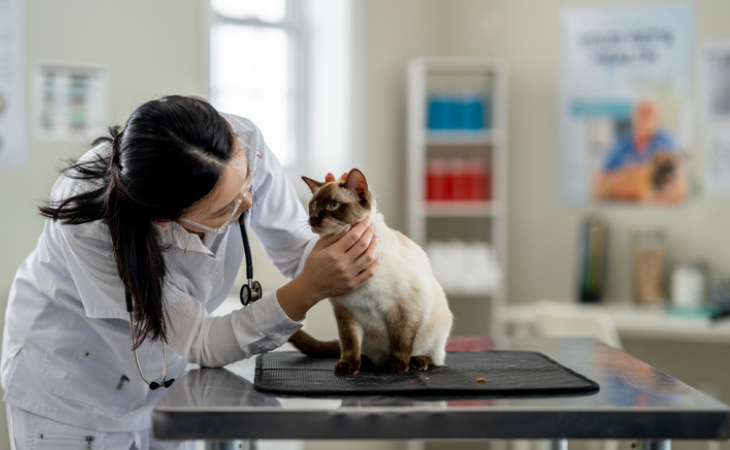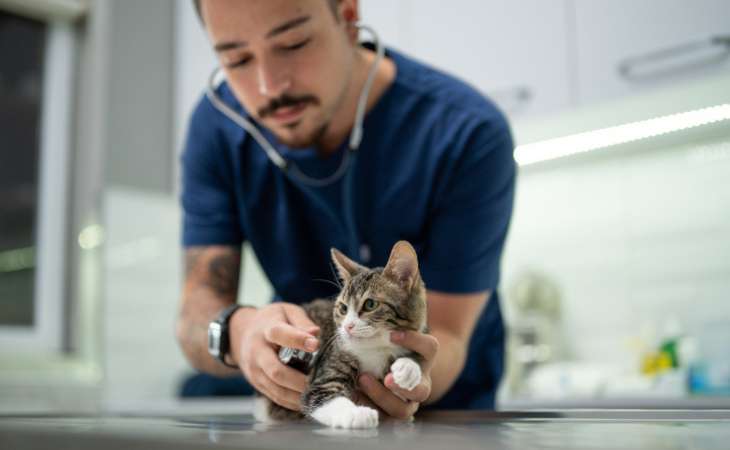Just like a visit to the doctor’s office, when you visit the vet, you need to prepare for it. Whether it be for a health check-up or an emergency, it’s important to prepare a list of questions to ask your vet before you arrive. Observe your cat for a few days before your visit so that you have a precise idea of the questions you should ask. If you’re a cat parent, here are 10 questions we recommend asking your vet.
This article might interest you: Cats and their fear of the vet
Is my cat at their ideal weight?
When you visit your vet, it’s important to ask the right questions. Ask your vet about the weight of your cat to guarantee their good health, but also their well-being. Like humans, obesity and being overweight progresses and affects around 40 to 50% of cats. There are several consequences when it comes to the health of your cat:
- urinary, skin, cardio-respiratory and digestive disorders,
- increased risks during surgery,
- liver dysfunction,
- joint pain…
During your vet visit, we highly suggest asking about your cat’s ideal weight. Your will be able to determine this and share advice about how to reach this objective. The ideal weight about your cat will depend on your cat’s morphology and breed.
For most healthy cats, the ideal weight is around 4 to 4.5 kg (≈ 8.8 to 9.9 lb) on average. Some breeds are small and can weigh around 2.2 kg (≈ 4.8 lb). Other larger cats can weigh around 11 kg (≈ 24.2 lb). Weighing your cat regularly (around once a month) will allow you to notice if your cat has gained weight and quickly adjust their diet.
How do I feed my cat correctly?
To keep your cat healthy, it’s necessary to provide them with a complete and balanced diet. During your vet visit, make sure to ask about the best and most appropriate diet for your cat. Ask your vet questions about the amount of food your cat needs to eat based on their breed, weight, age, and their level of activity.
Ask questions about any special diets or if your cat has health problems. Also, don’t hesitate to ask for advice about food supplements, treats, but also the practices to avoid when it comes to their diet. Whether homemade or industrial, in the form of pate or kibble (or a combination of the two), your feline’s nutrition must meet strict nutritional requirements in terms of carbohydrates, proteins, vitamins and minerals.

Is my cat sufficiently stimulated indoors?
To have a cat that is fully blossomed and in good health, you need to keep them physically and mentally stimulated. Your cat will give you useful advice to keep your cat entertained at home. Do not hesitate to ask questions about the different ways to keep your cat stimulated.
You can use what you have at home (paper bags, cardboard boxes, cat tunnels) and create a course with treats to search for.
This Letsgetpet article might interest you: How to keep your cat stimulated on a daily basis
What are the necessary vaccines?
Asking about vaccinations is also very useful. In France, for example, dog and cat vaccination is not mandatory (except for very particular cases). Vaccines are, however, extremely useful to protect your cat from serious or fatal diseases. Some vaccines are recommended depending on the breed, the age, the geographical location, or even their lifestyle. Moreover, some vaccines are mandatory to travel.
Essential shots protect your cat against diseases like:
- typhus,
- Cat coryza, viral rhinotracheitis or feline flu,
- infectious peritonitis,
- calicivirus,
- rabies,
- leukemia…
Inform yourself about the recommended vaccines for your cat. Ask your vet about those that are necessary to protect your cat against common diseases. You should also ask how often they need to be given.
Does my cat need a blood test?
If your cat has a health problem, your vet will probably need to carry out additional tests, such as a blood test, to establish a precise diagnosis. Blood tests allow your vet to detect and diagnose anomalies and can indicate certain diseases.
Blood analysis is also frequently used for prevention and for older animals. Your vet will make a recommendation depending on the situation, and the needs and physical condition of your cat.
Does my cat need dental care?
Like humans who visit the dentist regularly, cats need to go to the vet for an annual professional dental examination. Your cat’s dental health is important to keep their breath fresh, but also for their general well-being.
Bad hygiene can lead to common diseases like periodontitis and gingivitis. During your consultation, discuss the appropriate care to maintain impeccable hygiene for your cat’s dental care. A visit to the vet is the ideal opportunity to get valuable advice on how to brush your cat’s teeth and keep them healthy. Also, ask your vet to inspect your cat’s teeth and alert you of any issues.
Does my cat need flea and tick treatment?
If your cat spends a lot of time outdoors, inform yourself about additional preventive measures for parasites such as fleas, ticks and worms. A detailed discussion about vaccination and your cat’s diet with your vet will allow you to take better care of your cat in your daily life.
If your cat needs a flea or tick treatment, the type will be made depending on your cat’s lifestyle, geographical location, sensitivities, or even their closeness to you. Your vet will know how to recommend an effective external antiparasitic against ticks, fleas, but also eventually against aoutats (harvest mites), and sandflies…
How do I give my cat medication?
Sometimes our felines can get sick. In this case, we need to give them medicine. But how do we get a cat to swallow the remedy when they are fighting against it or refuse to swallow the treatment? For many cat parents, giving their cat medication is a true challenge.
A vet visit is, therefore, a moment to discuss your questions about how to give your cat a treatment. You will learn how to camouflage medication, and give them to your feline with gentleness so that they can get better?
This Letsgetpet article might interest you: How to give your cat medicine
Can I get a quote?
Except in cases of emergency or immediate interventions, you can ask your vet to establish a quote for your upcoming appointments to anticipate the price. Agree on the amount of the fee, prior to treatment, in a clear, detailed estimate. You will be able to avoid any misunderstandings with the vet.
When do we need to come back again?
Vaccination visits, puberty—there are multiple reasons you might need to visit a vet for a consultation. When your cat is sick, examinations are often needed to anticipate and judge the advancement of the disease and the efficiency of the treatment.
A schedule of visits can be put into place according to the state of your cat’s health and the age of your cat. Find out more about the dates of your next consultations in order to keep your cat in good health.
You might find this Letsgetpet article useful: Dogs: 10 questions to ask your vet

